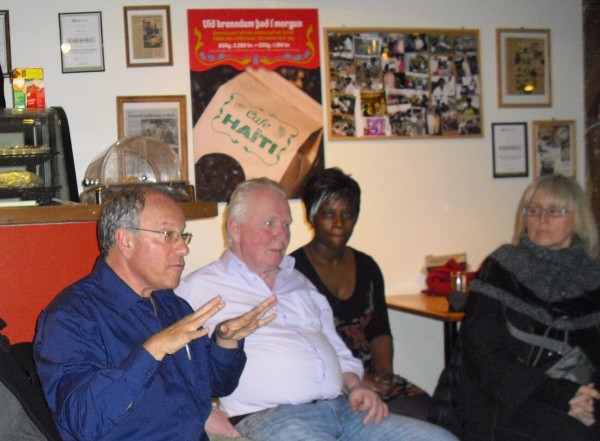In 2008 Iceland became the focus of attention for progressive social movements around the world as the country’s only three (private) banks collapsed in the aftermath of the Lehman Brothers bank collapse in the USA. As much to the surprise of the watching world as to Icelanders themselves, demonstrations took place in front of the Icelandic Parliament with thousands of protesters taking part. Within a few weeks the Government had fallen and the head of the central bank had gone.
This was followed even more shockingly by the President using his prerogative for the first time in history to not sign into law a bill that would force Icelandic tax payers to compensate British and Dutch savers for the money they lost on their investments. This led to a national referendum in March 2010 which was not approved by the public, then a second compromise bill was written and a second referendum took place which was also rejected.
The crisis led to the call for a new constitution to be written. Thus elections took place to elect a 25 member body that would write a new constitution. However, the Supreme Court stepped in to say that such a body was illegal. Parliament then appointed the same 25 elected people to a panel to come up with a draft constitution that could be adopted by Parliament.
This is as far as the knowledge goes for most of the outside world. Activists talk about the wonderful model of Iceland as the country that brought the government down and jailed its rogue bankers. This much is true, but how much has changed since?
Pressenza is in Iceland to cover the visit by the Chilean Humanist, Tomas Hirsch who has been invited by the local Humanist Party to discuss with activists about the experience of developing political campaigns in other countries, and we are taking this opportunity to update ourselves on the Icelandic Revolution. As it happens, some of the most read articles on English language Pressenza are about Iceland.
So, what happened to the Constitution? What banking controls were implemented? How is the development of real democracy? These are the questions we are interested to answer.
The answers are not very inspiring…
The 25-member panel of constitution writers had their hands tied from the beginning by the courts deeming the process illegal. Therefore Parliament, instead of legalising the process, decided to instruct the panel to work on a draft that Parliament itself could then approve, reject or modify.
The results have been disappointing. Firstly, the panel came up with no proposals for regulating the banks and today’s three new banks (which replaced the three collapsed banks) are free to do exactly the same as they did before. No Icelander we spoke to believes that banks would ever behave so irresponsibly again, but there are no proposals to regulate their activities.
On the other hand, some items seem positive. There is an article saying that national resources belong to the nation, for instance.
But the point is that there is no sign that the government has any intention of implementing the proposals. This is despite the fact that the proposals were submitted to a national referendum and around two thirds of those who voted backed the proposals.
So, you have a constitution writing process that is stripped of all its binding power, a constitution is then prepared that fails to tackle the issues of the banking crisis, and then the government refuses to adopt the proposed changes anyway!
We weren’t quite prepared for these answers. We imagined an inspiring constitution based on the value of human rights, new mechanisms for real and direct democracy and banking controls but the Icelandic Revolution has failed to deliver that.
The activists we spoke to, on the whole are disappointed and a bit disillusioned in some cases with the whole process. There are still people fighting to protect the most vulnerable people in society using the legal mechanisms available to them and there is a proliferation of new political parties preparing for the general elections in April this year but there has been no structural change.
Sigríður Þorgeirsdóttir, Professor of philosophy at the University of Iceland, explained that the changes to the system have been cosmetic. All 4 main political parties have changed their leadership but, “the overall system is intact.”
“The best thing now is that corruption is obvious, but politicians have very little space to make a difference.”
The Professor explained that in Iceland the real power is not in politics, it is in the hands of “external agencies” such as those that humanists might refer to as Big Capital. In this respect it is clear that Iceland is no different to the rest of the world, and just like the revolutions that have taken place in Tunisia in Egypt, and those attempted in Spain and social movements such as Occupy Wall Street, the Icelandic Revolution has fallen far short of the ideals proposed by its protagonists.






